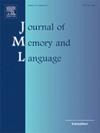研究老年人和年轻人语义和知觉错误记忆的认知相关性:一种多组潜在变量方法
IF 3
1区 心理学
Q1 LINGUISTICS
引用次数: 0
摘要
错误记忆信息会对日常功能产生负面影响,对于经常经历更高错误记忆率的老年人来说,这尤其成问题。由于老年人在记忆和认知方面存在相当大的差异,因此我们有必要了解使老年人面临产生错误记忆风险的因素。虽然额叶下部功能通常与错误记忆有关,但先前的研究表明,与错误记忆相关的因素也可能存在领域特异性。为了验证这种可能性,211名年轻人和152名老年人完成了测量语义错误记忆、知觉错误记忆、额叶功能、语义辨别和知觉辨别的任务。因素分析显示,与预测相反,语义和知觉错误记忆的个体差异最好由一个单一的、总体的错误记忆因素来代表。虽然认知能力通常与错误记忆无关,但语义辨别、知觉辨别和额叶功能单独都与错误记忆负相关,它们共同预测了年轻人中37%的方差和老年人中40%的方差。重要的是,这些认知能力对错误记忆的保护程度在老年人和年轻人之间没有差异。结果表明,对于老年人和年轻人来说,错误记忆倾向的个体差异被一个单一的总体结构所捕获,该结构与各种认知能力有负面(但冗余)的联系。本文章由计算机程序翻译,如有差异,请以英文原文为准。
Investigating the cognitive correlates of semantic and perceptual false memory in older and younger adults: A multi-group latent variable approach
Falsely remembering information can have negative consequences for day-to-day functioning and can be especially problematic for older adults who often experience higher rates of false memory. Because there is considerable variability between older adults in memory and cognition, it is essential that we understand the factors that place older individuals at risk for developing false memories. Whereas lower frontal functioning has previously been related to false memory in general, prior research suggests that there may also be domain-specificity in the factors associated with false memory. To test this possibility, 211 young adults and 152 older adults completed tasks measuring semantic false memory, perceptual false memory, frontal functioning, semantic discrimination, and perceptual discrimination. Factor analyses revealed that – contrary to predictions – individual differences in semantic and perceptual false memory were best represented by a single, overarching false memory factor. Although cognitive abilities were generally not related to false memory when assessed together, semantic discrimination, perceptual discrimination, and frontal functioning were all negatively associated with false memory in isolation, and jointly predicted 37% of the variance in younger adults and 40% in older adults. Importantly, the extent to which these cognitive abilities protected against false memory did not differ between older and younger adults. Results suggest that for both older and younger adults, individual differences in the tendency to falsely remember information are captured by a single overarching construct that has negative (yet redundant) associations with various cognitive abilities.
求助全文
通过发布文献求助,成功后即可免费获取论文全文。
去求助
来源期刊
CiteScore
8.70
自引率
14.00%
发文量
49
审稿时长
12.7 weeks
期刊介绍:
Articles in the Journal of Memory and Language contribute to the formulation of scientific issues and theories in the areas of memory, language comprehension and production, and cognitive processes. Special emphasis is given to research articles that provide new theoretical insights based on a carefully laid empirical foundation. The journal generally favors articles that provide multiple experiments. In addition, significant theoretical papers without new experimental findings may be published.
The Journal of Memory and Language is a valuable tool for cognitive scientists, including psychologists, linguists, and others interested in memory and learning, language, reading, and speech.
Research Areas include:
• Topics that illuminate aspects of memory or language processing
• Linguistics
• Neuropsychology.

 求助内容:
求助内容: 应助结果提醒方式:
应助结果提醒方式:


